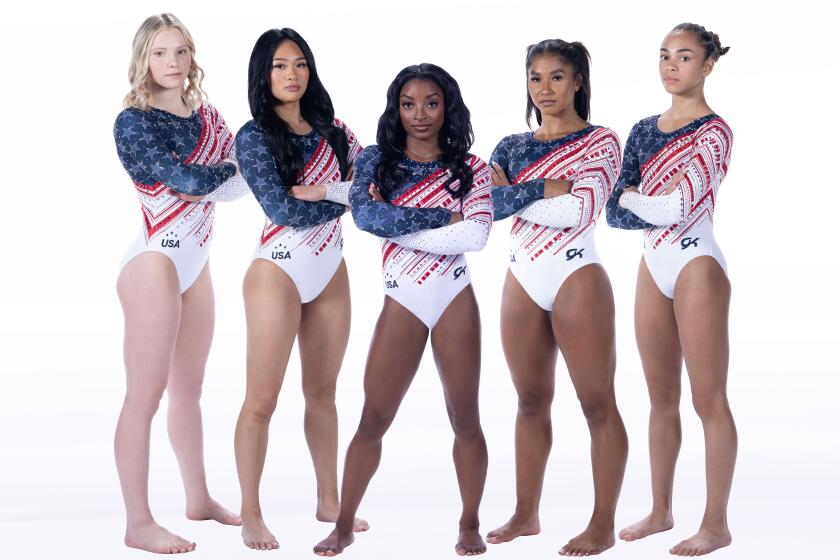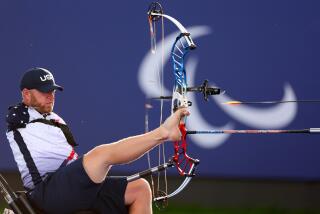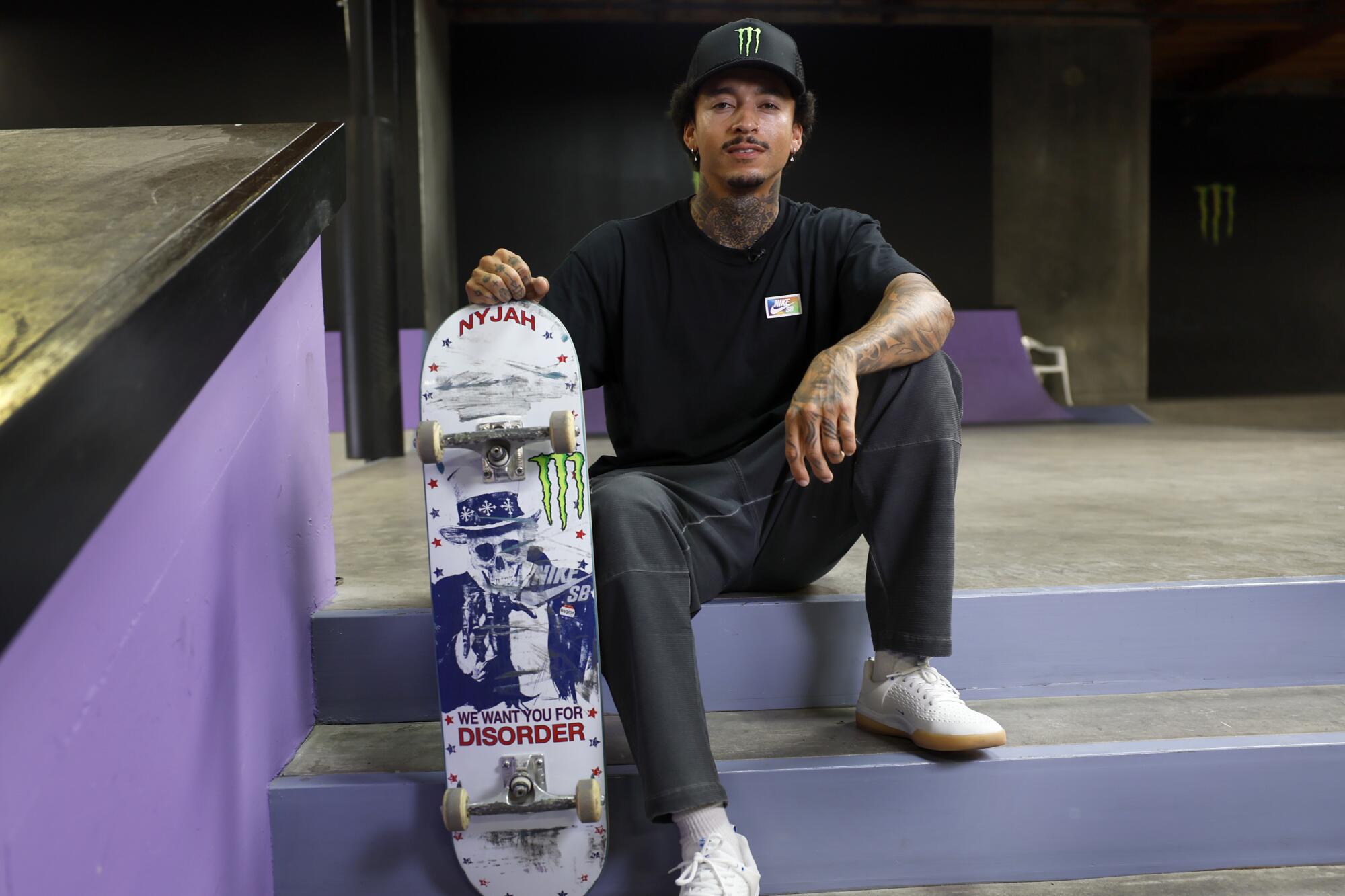
PARIS — The first half of the trick — a kickflip up to the rail, a lipslide down — went great. The second part, not so much.
Nyjah Huston landed too hard, tumbling off his skateboard and skidding across the pavement. Looking toward the sky, he screamed: “Dammit!”
The Southern California skater had arrived at the Tokyo Olympics as an icon in his sport, a millionaire several times over from prize money and endorsements. Winning gold figured to add a little more shine to his legacy.
But after that first bobble in the finals, he kept trying the same trick. And kept missing.
His seventh-place finish shocked the skating world. Speaking to reporters afterward, Huston looked a bit dazed, standing on his board as if someone might give him a chance to go back out and make things right.
“I’m sorry,” he said. “I know I definitely let some people down.”
If the memory of that day still hurts, you can’t hear it in his voice now, three years later. During a recent break from training at his private skate park in San Clemente, a warehouse filled with polished concrete ramps and quarter pipes, Huston talks about heading for the 2024 Paris Olympics with a new mindset.
“I’ve always been so competitive,” he says. “Like if I didn’t do good in a contest I would be really bummed on myself and take it really hard.”
A smile works its way across his face, slowly, suggesting this time will be different.

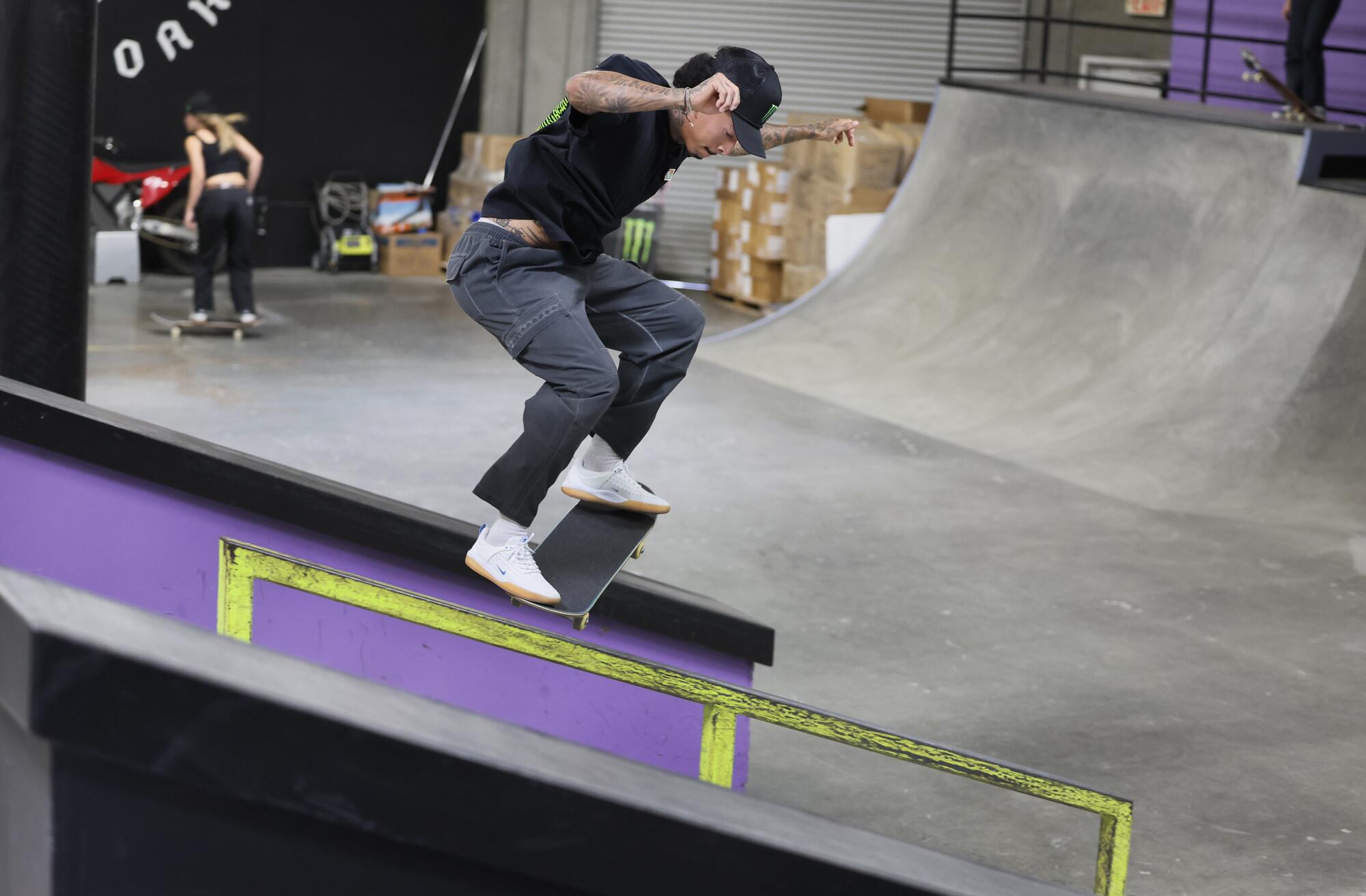
No one becomes one of the winningest skaters in contest history without being a little obsessed.
Huston’s backstory is folklore. Growing up at his family’s skate park in Davis, coached by a hard-driving father, he signed his first endorsement contract at age 7 and won the prestigious Tampa Am contest at 10.
There were some difficult years when his parents divorced but when a pro tour called Street League Skateboarding debuted in 2010, a 15-year-old Huston won the inaugural season championship.
“Nyjah’s just sort of a rare breed,” said Rob Dyrdek, a former pro skater who founded the league and is host of MTV’s long-running “Ridiculousness.” “Someone that is so gifted and focused at such a young age.”
GK Elite Sportswear created unique leotard designs to help Simone Biles, Suni Lee, Jordan Chiles, Jade Carey and Hezly Rivera sparkle at the Olympics.
Maybe success came too quickly. When Huston bought a $2.55-million house in San Juan Capistrano at just 18, neighbors complained about loud parties. A 2017 fight resulted in a misdemeanor disturbing the peace charge and, later, a crowded birthday celebration at a Fairfax district home violated the COVID-19 lockdown.
None of it slowed him on the path to six world championships and a record 23 overall skating medals at the X Games. If anything, raw talent and a slightly renegade persona — his body covered in tattoos — translated into 8 million followers on social media and lucrative deals with the likes of Nike and Monster Energy.
But on that day in Tokyo, as skating made its Olympic debut beneath a fiery sun, Huston ran smack into one of the undeniable truths of his sport.

As part of the U.S. team headed for Paris, Ruby Lilley explains that skating can be fickle, that even superstars can falter. She compares it to art.
“Sometimes you paint a really good picture,” she says. “And then sometimes you’re just like, what is this? Did I paint this? Was this done by a 3-year-old?”
Though skaters deal with this unpredictability all the time, they struggle to understand its origins. Lilley says: “That’s just how it works.”
Other individual sports such as surfing and golf are similar. Athletes have no control over weather conditions or an opponent having the performance of a lifetime. There are no teammates to carry the load on an off day.
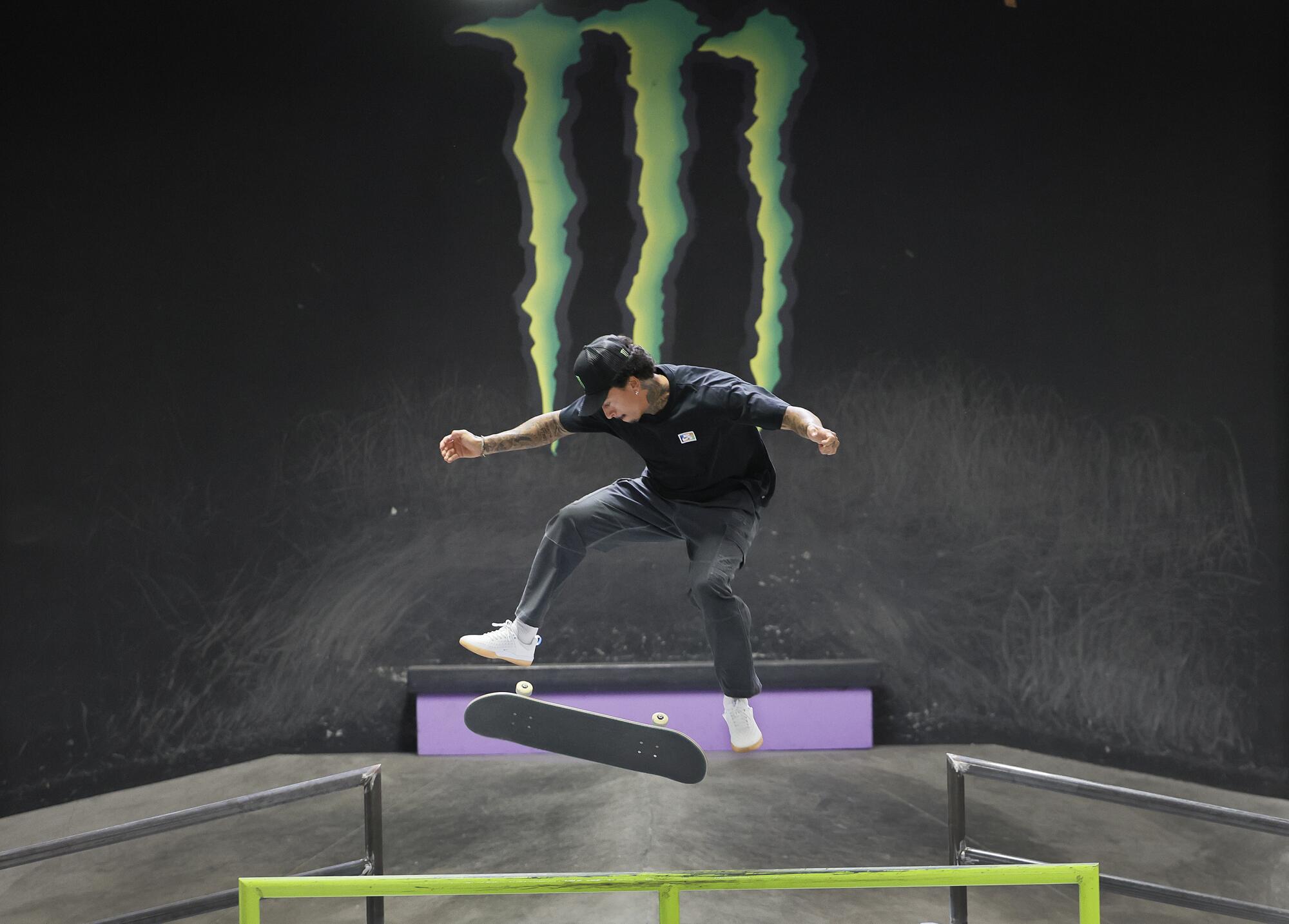
“It’s just sort of you,” says Jess Bartley, senior director of psychological services for the U.S. Olympic & Paralympic Committee.
Visualization and a positive mindset can be helpful, but Bartley also counsels athletes to plan for how they will respond “when things go terribly wrong. You have to think about what it feels like to fall off the skateboard, to fall on a trick that you’ve practiced.”
Which might explain Huston’s downfall in Tokyo. Those Games were held in 2021, delayed a year because of the pandemic, giving him more time to experiment. He had worked on the Caballero kickflip backside lipslide with a fakie 360 flip for weeks if not months, nailing it over and over in the days before competition.
That is why he kept attempting it in the finals.
“I probably would have switched up the trick I was trying,” he says. “Done something else and then maybe went back to it.
“Yeah, there’s learning lessons.”

Most kids start skating the same way — in the streets. That’s exactly where Huston took refuge from his Olympic heartbreak.
After more than a decade of training and contests, he needed to refocus on the simple joys of the sport — hanging out with friends, doing tricks in the schoolyard. They filmed themselves, compiling moments for a video called “Need That.”
The footage shows him laughing.
“We love skating with our friends,” he says. “We love feeding off that energy.”
Much like surfing, skating began as a form of self-expression, a lifestyle taking shape outside the regimen of judges and rules. As Lilley said, tricks are art and the skateboard is a painter’s brush.
Huston learned not to be so competitive, so intense. His “more fun” approach showed promise by way of victories on the world tour and more X Games titles. However, that doesn’t mean he will be the favorite in the Olympic men’s street contest Saturday.
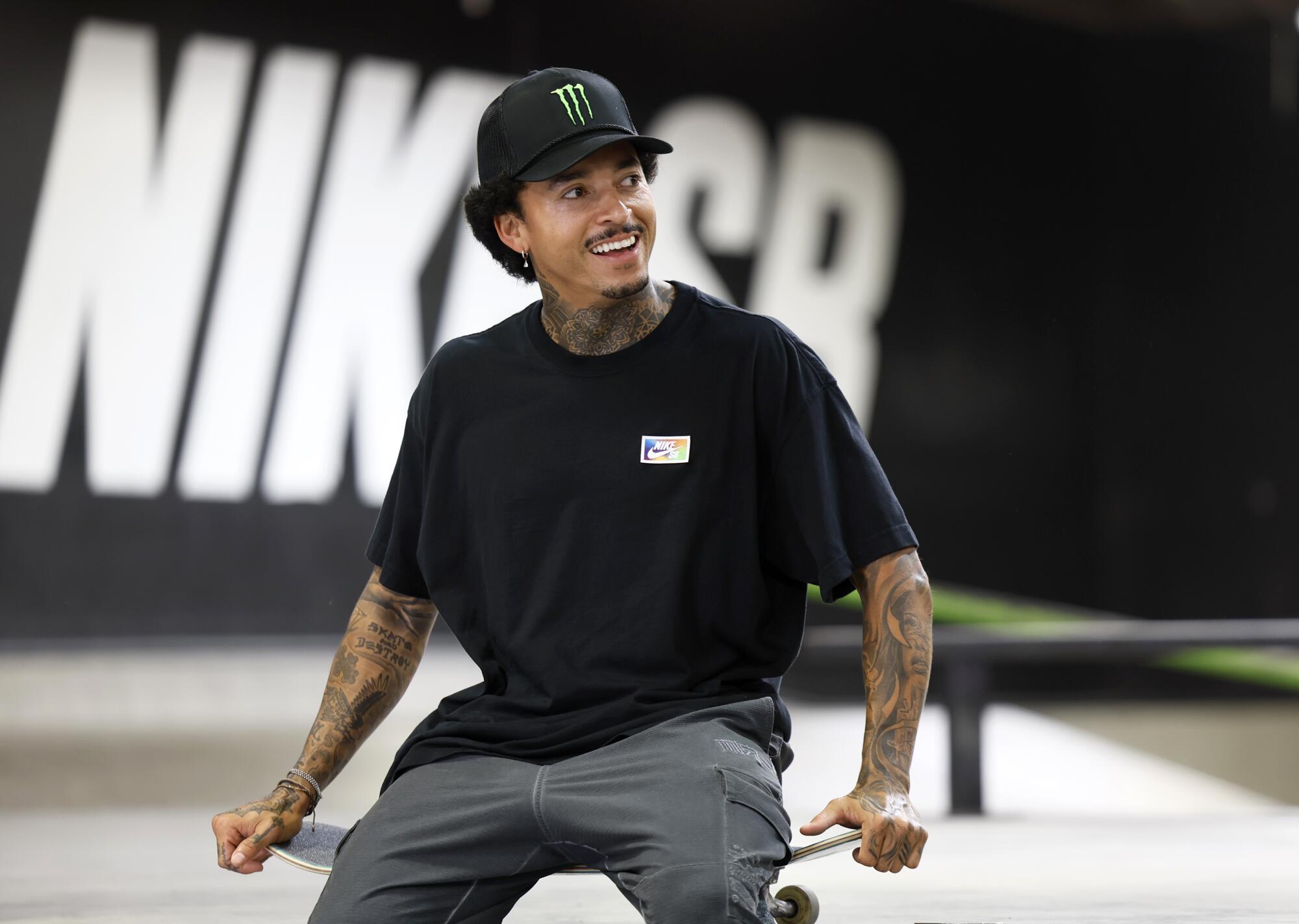
Defending gold medalist Yuto Horigome and his Japanese teammates — all in their teens and early to mid-20s — have become a juggernaut. Jagger Eaton, 23, of the U.S. has climbed into the Top 5 in the world rankings.
Huston, ranked sixth and nearing 30, has fought back from knee surgery in 2022 to barely qualify for the U.S. team. He is almost — if not quite — an underdog.
So watch closely when the competition begins at Place de la Concorde this weekend. You might see him glancing at the silhouette of the Eiffel Tower in the distance. Or taking a moment to soak in the crowd at these post-pandemic Games.
Call it gratitude. The wisdom of growing older. He is trying to think of contests as the “icing on the cake” after a lifetime of doing what means most to him.
“I’ve got to try not to put too much pressure on myself,” he says.
His smile suggests everything will be fine, regardless of the result. In the next breath, though, he wonders if staying loose might just help him win.
More to Read
Go beyond the scoreboard
Get the latest on L.A.'s teams in the daily Sports Report newsletter.
You may occasionally receive promotional content from the Los Angeles Times.

